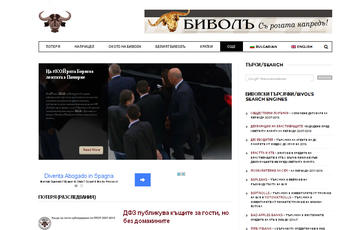
Investigative website Bivol.bg was stripped of the most prestigious Bulgarian investigative journalism prize awarded by the Radostina Konstantinova Foundation after its managing board decided to overrule the choice of the jury
Link: Index on Censorship
Each year the Radostina Konstantinova Foundation collects nominations for investigative journalism. A jury of colleagues from different media outlets awards a grand prize for investigative reporting and other prizes. This year the jury decided to grant the grand prize to Bivol – the investigative news website wrote in a statement.
Bivol.bg has lead many investigations into prominent figure and businesses in Bulgaria, such as current second-term Prime Minister, Boyko Borisov, controversial DPS lawmaker and mogul Delyan Peevski, as well as the collapsed Corporate Commercial Bank (CCB), where massive fraud was uncovered in 2014. After examining the investigations, the jury decided by a majority vote to award the Grand Prize to Bivol, namely to Assen Yordanov – journalist and director of the website and its editor-in-chief – Atanas Tchobanov.
After learning the jury's decision, the managing board reportedly urgently summoned a meeting on how to prevent giving the award to Bivol. To justify the unprecedented withdrawal of this prize, the Board issued a statement that said Bivol is an anonymous website and that it was unclear who the people standing behind it were, causing a serious public outcry and media discussions.
“We condemn this act of hostility towards Atanas Chobanov and Assen Yordanov, two investigative journalists who were named as RSF information heroes in 2014,” said Pauline Adès-Mével, the head of RSF’s EU-Balkans desk. “The Radostina Konstantinova Foundation is trying to damage their reputation by using spurious and unacceptable arguments. The real problem was the embarrassment caused to certain Bulgarian politicians by the information they revealed.” – an RSF statement said.
This publication has been produced within the project European Centre for Press and Media Freedom, co-funded by the European Commission. The contents of this publication are the sole responsibility of Osservatorio Balcani e Caucaso and its partners and can in no way be taken to reflect the views of the European Union. The project's page

 Bulgaria: Investigative website Bivol.bg stripped of prize
Bulgaria: Investigative website Bivol.bg stripped of prize 




 All the contents on the Osservatorio Balcani e Caucaso website are distributed with a
All the contents on the Osservatorio Balcani e Caucaso website are distributed with a 